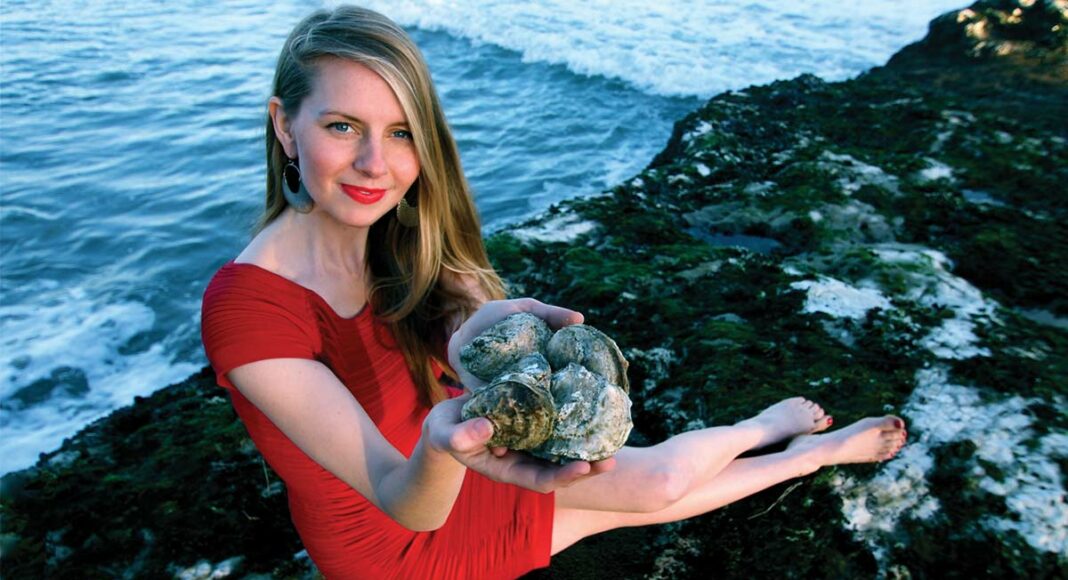I meet Elizabeth Birnbaum at Hidden Peaks Teahouse, and over a two-hour pot of pu’erh we fill the zen air between us with talk of hedonism, guilty pleasure and the history of aphrodisiacs. Birnbaum launched the Curated Feast last June, and is in the middle of preparing her research for Sexy-Self Love, a women’s event presented by Santa Cruz Socialites at Pure Pleasure next week. While the event is designed around the truth that you can’t love someone else if you don’t love yourself, Birnbaum’s participation promises a rich cultural exploration of love and sex.
“Apparently gladiator sweat was an aphrodisiac to Roman women, because the gladiators were sex symbols. And so the women would use their sweat in cosmetics,” says Birnbaum, her eyes wide. She says that while most of her research starts on the Internet, it ends in the library or with a phone call to a UCSC professor. Then, through Curated Feast, she collaborates with local chefs like LionFish SupperClub to orchestrate a dinner experience that brings to life, say, Ancient Greece or the Silk Road.
There won’t, unfortunately, be any gladiator sweat at Sexy-Self Love, but Birnbaum is working with chocolate maker Becky Potter of Pure Heart Chocolate, and chef Hedy Nochimson to create four small aphrodisiac dishes. Each love bite will introduce a different speaker, including Bez Maxwell on the female orgasm, Amy Baldwin on self-pleasure with tingly toys and Denise Elizabeth Byron on discovering your inner sensuality.
“From 1000 B.C, they found coriander seeds in Egyptian tombs, and coriander seeds were linked to being an aphrodisiac,” says Birnbaum. “And so it’s a way of saying ‘OK, well, we hope that love continues.’ It’s beautiful. So there are all of these poetic, amazing stories about aphrodisiacs.”
But underneath the myth and lore, Birnbaum says, is the fact that foods’ psychoactive chemicals affect our mood and physiology. “If you’re eating foods that trigger physiological reactions, that get your heart pumping, your blood vessels opened up, that make you breathe deeper and sweat a little, all of these effects kind of feel like love might feel,” says Birnbaum, speaking about the capsaicin in hot peppers in particular.
The Aztec emperor Montezuma is said to have consumed chocolate in vast quantities to satisfy his many wives. Among its chemical constituents, chocolate contains tryptophan, which helps produce the serotonin needed for elevated mood and sexual arousal. It also contains phenylethylamine, a stimulant released in the brain when we fall in love.
“Aphrodisiacs have to be put in cultural context to be understood,” says Birnbaum. “Peacock tongues and black pepper were eaten by the Ancient Roman elite. They were both considered aphrodisiacs, and were brought out at special feasts. It almost makes sense that these foods, which would have been a part of a lavish display of wealth, were also getting people excited in other ways.”
Indeed, most foods that are purported to be aphrodisiac (and there are a lot) are expensive or risky to acquire, or are steeped in the power of suggestion. For instance, science still hasn’t figured out whether it’s the high zinc level in oysters (low levels of zinc are linked to low libido) or their faint resemblance to female genitalia that is responsible for their passion-inducing reputation.
“Food is inherently sensual,” says Birnbaum—and we both agree that we wouldn’t want to share a meal with an ex we felt tender about, because it’s also so intimate to eat with someone. To be present in the moment—without phones—and sharing the ecstasy of each bite is not only an experience that parallels the sexual act itself, it’s also a maxim of the slow food movement, in which Birnbaum has been active for many years now. “I think that with Instagram, and ‘food porn’ … it’s funny because if you’re watching real porn, you can interact with it in your own way, ostensibly. But with food porn, what’s your interaction? It’s like, here’s this thing I’m eating, isn’t it sexy and beautiful? But you can’t even smell it, you can’t taste it,” says Birnbaum.
It’s exactly this disconnect that Birnbaum loves to reconstruct, in a multi-dimensional way—by teaching not only where one’s food came from, but also what it has meant to people and events over the eons.
Sexy Self Love event is 7-9 p.m., Feb. 18 at Pure Pleasure. Tickets are $28.42 on eventbrite.com. For info on Curated Feast see thecuratedfeast.org.













